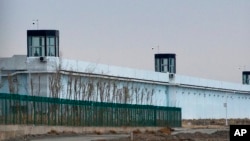Preparation for Rights Chief's Visit to China Begins
A team from the U.N. human rights office arrived in China on Monday to prepare for the long-delayed visit expected in May by High Commissioner for Human Rights Michelle Bachelet to Xinjiang, where rights groups and some Western governments including the U.S. accuse the Chinese government of committing serious abuses against Uyghurs and other Muslim minorities.
UN Team in China Ahead of Rights Chief Visit to Xinjiang
Database Lists Victims of Beijing Repression in Xinjiang
Gene Bunin, a Russian-American who lived in Xinjiang for several years, has published a Xinjiang Victims Database of Uyghurs who have disappeared. The archives describe what’s happening in the Xinjiang Uyghur Autonomous Region as “slow-motion genocide.”
Rights Chief Urged to Release Report Related to Uyghur Abuses
U.S. Ambassador Linda Thomas-Greenfield urged the United Nations high commissioner for human rights to release the report on Xinjiang ahead of her visit to China in May. The Chinese mission responded by saying Beijing welcomes the visit but “there is no place for political manipulation and malicious pressure.”
UK Poised to Ban Health Care Products from Uyghur Region
The United Kingdom is on the verge of prohibiting the government from buying health care products made in China’s Xinjiang region, where rights groups accuse China of Uyghur forced labor.
News in brief
— A Wilson Center report finds more than 1,500 Uyghurs have been detained or forcibly returned to China by other countries. The report details how China’s security ministry works with governments in other countries. The report says China’s repression of Uyghurs overseas is a “growing phenomenon.” It documents methods used against Uyghurs abroad by China, including freezing of assets, cyberattacks and intimidation.
Quote of note
“It was becoming very difficult to have conversations with people, because you felt like you potentially could be putting them in danger. I had one friend who I saw on the street, and he motioned for me to follow him. He took me aside and explained to me very quickly: ‘My family is fine because I have a Chinese wife, and we’re OK, but I can’t be seen talking to foreigners right now. Sorry, we can’t interact.’ The next times we saw each other, we would nod or exchange glances, but eventually we reached the point where we pretended not to see each other.” — Gene Bunin, founder of Xinjiang Victims Database.




